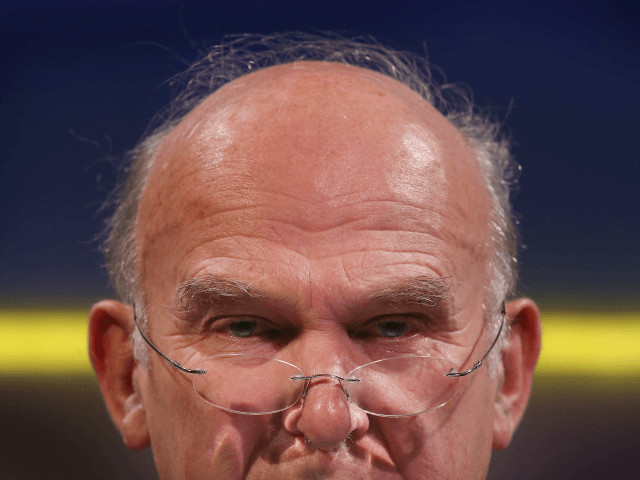Liberal Democrat leadership hopeful Sir Vince Cable has revealed he is holding informal talks with Tory Remainers to force the Government into a so-called ‘Soft Brexit’.
The 74-year-old was business secretary under the Cameron-Clegg coalition administration but lost his seat in Parliament when the Tories won their small, upset majority in 2015.
He reclaimed it in the June 2017 snap election as former leader Nick Clegg lost his in Sheffield, setting the stage for an unlikely comeback when Clegg’s successor Tim Farron stepped down, citing the incompatibility of the party’s left wing dogma with Christian values.
Cable’s boast of holding informal talks with Tory Remainers about strategies to keep Britain within the EU’s Single Market, revealed by The Telegraph, may come as something of a surprise.
He proclaimed as recently as January 2017 that it was “time to end Free Movement”, citing concerns about the way the regime discriminates against “Americans and Australians” in favour of “Poles and Romanians”, and depresses wages in working-class occupations “like building and taxi driving”.
In an article published in The Guardian on the anniversary of last year’s Brexit vote, however, the former oil corporation employee declared:
“I have a liberal view of immigration, and I certainly subscribe to the principles of the single market (and, like my Labour predecessors in government) sought to promote and deepen it. You can’t say often or loudly enough that Britain has benefited hugely from immigration economically, socially and culturally.”
The essential building blocks of the Brussels-regulated Single Market are the so-called ‘Four Freedoms’.
Free Movement of Goods allows trade between EU member-states free of tariffs and largely free of regulatory barriers – but comes at the cost of not being allowed to conduct an independent trade policy. The EU sets a Common External Tariff on goods from outside the EU, prohibiting Britain from striking bilateral trade agreements with old partners such as Australia or the U.S.
Free Movement of Capital allows capital to flow across the EU largely unrestricted, easing bureaucratic hurdles for investors but providing big businesses in Britain with various lucrative tax avoidance opportunities, too.
Free Movement of Services, whilst in theory a terrific boon to British financial hubs in London, Edinburgh, and elsewhere, does not exist “in any meaningful sense of the term”, according to the All-Party Parliamentary Group for European Reform and various trade bodies and fund managers.
Free Movement of Labour, finally, has become in effect Free Movement of People and is frequently referred to as such, with migrants able to come to Britain in unlimited numbers effectively unvetted, with no requirement for them to demonstrate they have a job to go to.

COMMENTS
Please let us know if you're having issues with commenting.